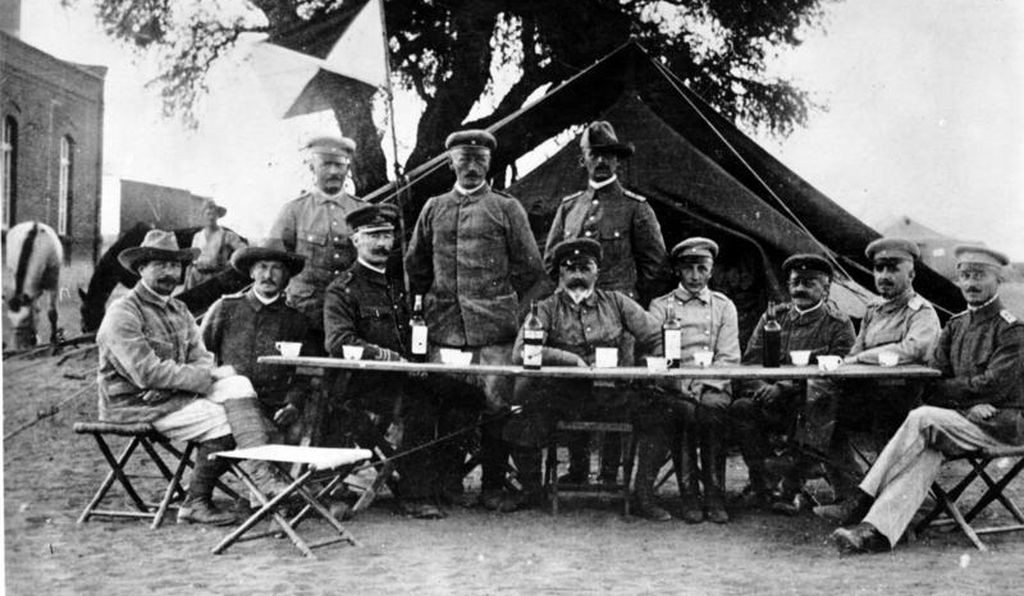
Socialistisk Biblioteks Tidslinje med links til begivenheder og personer i 1904.
Se også Index over personer, organisationer/partier og værker (som bøger, malerier, mm.), steder, begivenheder, mv., der er omtalt på hele Tidslinjen, titler og indhold på emnelisterne osv.
Bladliste
Nye blade 1904:
Ny Tid
Se:
Arbejderhistorisk bladliste, under året 1904.
12. januar 1904
I kolonien Tysk Sydvestafrika (Namibia) startede Herero-folkets oprør mod det tyske kolonistyre, som førte til næste 3 års udryddelseskrig, kaldt første folkemord i det 20. århundrede (folkemordenes århundrede).
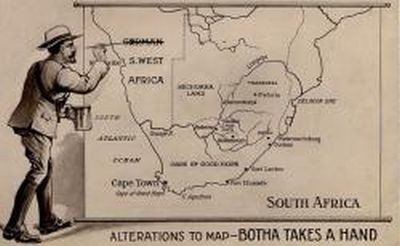
Se:
- Folkedrabet på Herero- og Namaquafolkene (Wikipedia.dk). Med links til længere artikler på engelsk, norsk, tysk og den fremhævede på afrikaan!
- Herero Revolt 1904-1907 (South African History Online). With links.
Namibia: Tysklands fortrængte kolonihistorie (Autonom Infoservice, 14. november 2022). “Der er gået mere end et århundrede siden Herero og Nama gjorde oprør mod det tyske koloniregime i Tysk Sydvestafrika … De tyske koloniherrer reagerede grusomt: Ifølge gængse vurderinger dræbte de tyske kolonisoldater mellem 50.000–70.000 mennesker.”
Folkedrabet i Namibia 1904-1908. Af Allan Spangsberg Nielsen (Folkedrab.dk, 2012). “Folkedrabet på hereoer og namaer i Namibia var på mange måde en skræmmende generalprøve på Nazitysklands senere jødeforfølgelser, bekæmpelse af politiske modstandere, koloniseringspolitik i Østeuropa og udryddelses- og arbejdslejre.”
Det 20. århundredes første folkedrab: folkedrabet i tysk Sydvestafrika. Af Kristian Sørud (Aalborg Universitet, historiepeciale, 2019, 80 sider). “Dette speciale vil forsøge at afdække, hvad det var, der skete i Tysk Sydvestafrika. Det vil give et indblik i folkedrabsbegrebet, og det vil ikke mindst fokusere på, hvad der fik de tyske kolonialister til at ville udrydde hele befolkningsgrupper.”
Det ‘glemte’ folkemord i Tysk Sydvestafrika – mellem politiske fejder og historiske fakta. Af Mads Bomholt Nielsen (Videnskab.dk, 30. juli 2016). “Tysklands fortid som kolonimagt i Namibia kom frem under et diplomatisk stormvejr mellem Berlin og Ankara. Men stemmer de politiske udlægninger overens med de historiske udlægninger, spørger denne forsker.”
Rosa Luxemburg exposed the colonial genocide in Namibia. By Peter Hudis (Jacobin, February 6, 2024). “When Germany pledged to oppose South Africa’s genocide case against Israel, the Namibian government reminded German politicians of their state’s genocidal record in Africa. Rosa Luxemburg exposed the crimes of German colonialism while they were happening.”
Germany moves to atone for ‘forgotten genocide’ in Namibia. By Jason Burke & Philip Oltermann (The Guardian, 25 December 2016). “Berlin discusses possible reparation payments over massacre … in early years of 20th century”German atrocities in colonial Africa.”
Germany and genocide in Namibia (Pambazuka News, Issue 577, March 19, 2012; online at Links). “We see this special issue as the start of a debate, not only about what happened in Namibia, but about German and European colonialism in general.”
A brutal genocide in colonial Africa finally gets its deserved recognition. By Daniel A. Gross (Smithsonianmag.com, October 28, 2015). “Activist Israel Kaunatjike journeyed from Namibia to Germany, only to discover a forgotten past that has connections to his own family tree.”
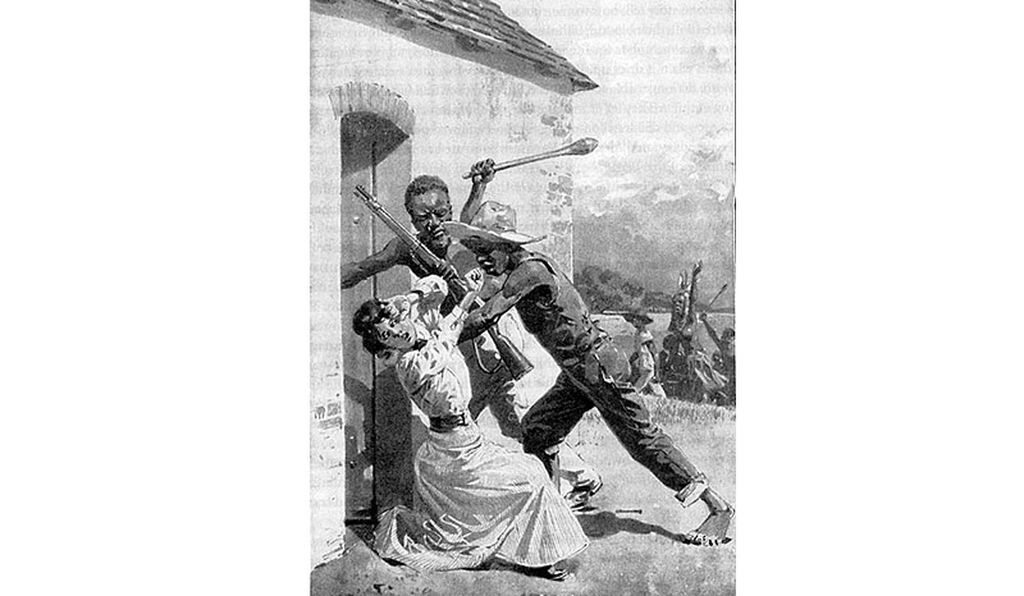
Why Germany’s apology for its 1904-1908 genocide in Namibia does not go far enough (Democracy Now!, June 11, 2021). Amy Goodman interview Heiko Maas, Saara Kuugongelwsa-Amadhila (PrimeMinister), Utara Mooru, Samuel West and others. “Between 1904 and 1908, German colonizers killed tens of thousands of Ovaherero and Nama people in Namibia. Last month, for the first time, German Foreign Minister Heiko Maas officially described the massacre as genocide and outlined an offer of more than $1.34 billion in development aid to Namibia.”
See also:
Walter Rodney: The Imperialist Partition of Africa (Monthly Review, Vol.21, No.11, April 1970, p.103-114; online at Marxists Internet Archive).
The Kaiser’s Holocaust. By Mark Winter (RS21: Revolutionary Socialism in the 21st Century, November 22, 2017). Review of David Olusoga and Casper W. Erichsen, The Kaiser’s Holocaust: Germany’s Forgotten Genocide and the Colonial Roots of Nazism (Faber and Faber, 2010). “Long hidden from history, this is a chapter in European history that has at last been exposed.”
Imperialism and genocide in Namibia. By Tom Saunders (Socialist Action, April 3, 1999). “How did Adolph Hitler acquire many of his racist ideas?”
Litteratur:
“Ich glaube, dass die Nation als solche vernichtet werden muss –“: radikaliseringen af den tyske nedkæmpelse af hereroopstanden 1904. Af Henrik Lundtofte (Den jyske historiker, nr.90, december 2000, s.74–105).
“The Germans in South West Africa”. Part 4 in Mark Cocker: Rivers of Blood: Rivers of Gold: Europe’s Conflict with Tribal People (Pimlico, 1999, p.267-357).
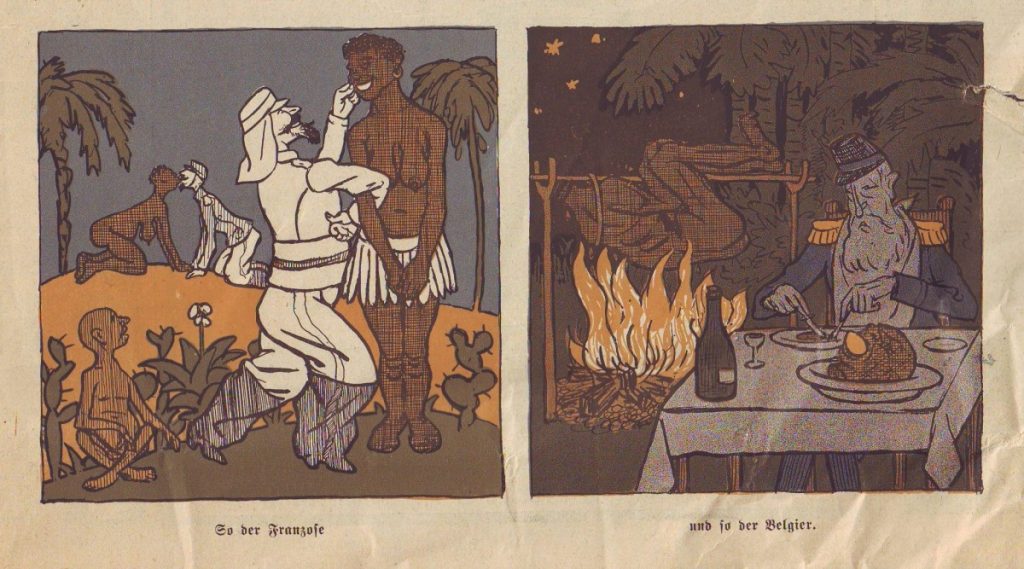
1. februar 1904
Den franske kommunist, trotskist og socialist Pierrre Naville fødes i Paris (nogle kilder i 1903). (Dør i Paris 24. marts 1993, se denne)
13. marts 1904
Den rådskommunistiske forfatter og marxistiske økonom Paul Mattick fødes i Pommern, Tyskland, opvokset i Berlin. (Dør 7. februar 1981)
Se på Socialistisk Bibliotek:
Personresursen Paul Mattick (1904-1981)
19. maj 1904
Den “libertære marxist” Daniel Guerin fødes (dør 13. april 1988).
Se på Socialistisk Bibliotek:
Personresursen Daniel Guérin (1905-1988)
6. maj 1904
Den svenske proletarforfattter Harry Martinson fødes i Jämshög, Blekinge (dør 11. februar 1978).
Nobelprisen i litteratur 1974.
Se:
Harry Martinson (Wikipedia.sv)
Harry Martinson – naturens, havens och rymdens diktare. Af Karl-Olof Andersson. Bogomtale (Fagboginfo.dk; online på Internet Archive)
9. juni 1904
Lederen af Frihedsrådet og senere rektor for KU (1966-72) Mogens Fog fødes. (Dør 16. juli 1990, se denne)
10. juni 1904
Den danske kommunist Otto Melchior fødes (dør 16. februar 1945).
Se:
Otto Melchior (Wikipedia.dk)
Otto Melschior: (Gravlunden for KZ-fanger; Mindelunden i Ryvangen).
Litteratur:
Klassekammeraten – Otto Melchior – kommunisten, der forsvandt. Af Arne Hardis (2010)
(Bogens første 24 sider + div. sider + register på Google Books) – Omtale (information, 2.9.2010)
Se også på Socialistisk Bibliotek:
Tidslinjen: 12. november 1940, om Arne Munch-Petersen.
Tidslinjen: 16. juli 1990, om Mogens Fog.
16. juni 1904
Bloomsday: dagen for Leopold Bloom tur rundt i Dublin i James Joyces roman Ulysses. (Dansk udgave 1949).
Se:
- James Joyce (Denstoredanske)
- James Joyce (Wikipedia.dk) + James Joyce (Wikipedia.org)
- Ulysses af James Joyce. Af Torben Wendelboe (Litteratursiden.dk, 17. december 2014)
- James Joyce (Spartacus Educational)
- James Joyce + Ulysses (novel) + Bloomsday (Wikipedia.org)
James Joyce’s Dubliners: letter from an editor of In Defence of Marxism (In Defence of Marxism, 26 January 2024). “Hamid Alizadeh writes on Joyce’s Dubliners: a masterful critique of the paralysis, hypocrisy and alienation of Irish bourgeois society in the 20th century, which epitomised the ferment brewing in Ireland in the years prior to the Easter Rising of 1916.”
James Joyce was a product of Ireland’s revolutionary generation. By Adam Coleman (Jacobin, September 30, 2023). Review of Luke Gibbons, James Joyce and the Irish Revolution: The Easter Rising as Modern Event (University of Chicago Press, 2023, 296 p.). “Cold War liberals presented James Joyce as a universal writer and ignored the clear political undercurrents running through his work. A new generation of critics have restored the vital link between his novels and Ireland’s uncompleted revolution.”
The quiet radicalism of James Joyce’s Ulysses. By Mark Steven (Jacobin, June 16, 2021). “On Bloomsday, we’re celebrating James Joyce’s Ulysses. It’s one of the greatest novels ever, and it calls forth a world where every named and unnamed minor character gets to be the hero. What could be more socialist?”
The Socialism of James Joyce. By Donal Fallon (Jacobin, January 13, 2021). “Today marks 80 years since James Joyce’s death. Joyce’s flirtation with organized socialist politics was brief, but he continued to find inspiration in socialist texts throughout his life.”
James Joyce – the slender Irish tenor. By Eoghan Conaughton (Irish Marxist Review, Vol.5, No.15, 2016, p.68-72). “Ulysses is a remarkable piece of literature which has baffled professors and delighted readers for decades.”
28. juni 1904
“De fattiges Titanic-katastrofe” da udvandrerskibet “Norge” sank og 635 omkom. Kun 168 personer overlevede og måte vente 8 dage i redningsbådene. Skibet ejedes af Tingvalla-rederiet.
Se:
DS “Norge” (Wikipedia.no)
Se også på Socialistisk Bibliotek:
Tidslinjen: 15 april 1912, om Titanic-forliset.
12. juli 1904
Den chilenske venstrefløjs-digter Pablo Neruda fødes i Parral, Chile (dør 23. september 1973 i Santiago, Chile).
Nobelprisen i litteratur 1971.
Se:
- Neruda, Pablo (Leksikon.org)
- Pablo Neruda (Denstoredanske)
- Pablo Neruda (Wikipedia.dk)
26. august 1904
Christopher Isherwood fødes i High Lane, Cheshire, Eng. (dør 4. januar 1986 i Santa Monica, Calif.).
Se:
Christopher Isherwood (Denstoredanske.dk)
Christopher Isherwood(Wikipedia.org)
10. september 1904
Den amerikanske socialist og anti-stalinist Max Shachtman fødes. (Dør 4. november 1972). Han var en af lederne i den amerikanske trotskistiske bevægelse i 1930erne og af “Third camp”-politiken fra 40’erne, vendt både mod den vestlige kapitalisme og den byrokratiske kollektivisme i Sovjetunionen.
De to politiske begrebet “third camp” og byrokratisk kollektivisme er kernen i den såkaldte shachtmanisme på den amerikanske venstrefløj.
I 1950erne under den kolde krig rykkede hans anti-kommunisme ham kraftigt mod højre.
Se:
- Max Shachtman (Marxists Internet Archive; Marxists writers). With Introduction by Ernest Haberkern, Bibliography + Articles and Books/Pamphlets online (1933-1950)
- Max Shachtman (Spartacus Educational)
- Max Shachtman (Wikipedia.org). See also: Shachtmanism
- Max Shachtman (pdf) (Lubitz Trotskyana Net, December 2005). With Biographical sketch (p.1-6) + Selective bibliography (p.6-14)
Articles:
A pioneering work on Lenin and Bolshevism (International Socialist Review, Issue 112, Spring 2019). Paul Le Blanc reviews Max Shachtman, In Defence of Bolshevism (Phoenix Press, 2018, 311 p.).”This is an important work on Lenin and the Bolshevik tradition.” See also review by Barry Finger: Bolshevism, the civil war and after (Solidarity & Workers Liberty, Issue 497, 26 February 2019).
Max Shachtman. By Sean Matgamna (Workers Liberty, 24 August 2018). “Through most of the 1930s Max Shachtman had played a role second only to Trotsky in propagating revolutionary Marxism. But by the time he died in 1972 he had moved far from such politics. Sometime in the later 1950s Shachtman became convinced that revolutionary politics in the USA were not ‘operational’ in the foreseeable future.”
Max Shachtman: a political-biographical essay. By Albert Glotzer, et al. (Marxists Internet Archive). “For half a century, Max Shachtman was at the center of US and international controversies. In the early Twenties, at the age of nineteen, Shachtman was the talented leader of the youth section of the early Communist movement. A decade later, he became one of the three principal founders of the American Trotskyist movement.”
The fate of Max Shachtman: a critical assessment. By Sean Matgamna (Workers Liberty, Issue 48, June 1998). “For Shachtman with his comrades, after Trotsky’s death bore the main burden of ensuring the continuity of unfalsified Marxist socialism.”
Shachtman and his legacy. By David Finkel (Against the Current, No.57, July/August 1995). Review of Peter Drucker, Max Shachtman and His Left: A Socialist’s Odyssey through the ‘American Century’ (Humanities Press, 1994, 346 p.). See also review by Jim Higgins (Revolutionary History, Vol.5, No.3, Spring 1995, p.209–213) + Ernie Haberkern: The Left and Max Shachtman, Part 1 (Workers’ Liberty, No.25, October 1995) + Part 2 (January 1996).
Max Shachtman: his ideas and his movement (pdf). By Tom Kahn (Dissent/Democratiya, Issue 11, Winter 2007, p.252-259). “This previously unpublished tribute to Shachtman was written in 1973.”
The two deaths of Max Shachtman. By Julius Jacobson (New Politics, Vol.10, No.2, Winter 1973, p.96-99; online at Marxists Internet Archive). “In truth, Max died two deaths. A finite physical death on 4 November 1972 and an earlier moral and political death that has no recordable day or even year.”
Max Shachtman: Ett politiskt porträtt. Av George Novack (Marxists Internet Archive, Svenska arkivet). Från International Socialist Review, nr. 2, 1973 och nr. 3, 1973.
Udvalgte bøger/pjecer af Marx Shachtman:
The Bureaucratic Revolution: The Rise of the Stalinist State (pdf) (The Donald Press, 1962, 360 p.; online at Hathitrust.org)
Sacco and Vanzetti: Labor’s Martyrs (pdf) (International Labor Defence, 1927, 80 p.; online at Marxists Internet Archive)
Genesis of Trotskyism (Marxists Internet Archive; Marxist Writers). Oprindelig titel (1933): Ten Years: History and Principles of the Left Opposition. Klassisk pjece, den første der blev skrevet i vesten om kampen i det sovjetiske kommunistparti og Venstreoppositionens historie og politik.
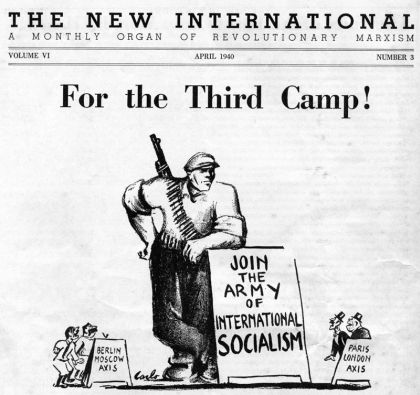
Se også:
- Third camp (Wikipedia.org)
- Third Camp Socialism (site)
The Third Camp in theory and practice: An interview with Joanne Landy and Thomas Harrison (New Politics, August 12, 2018). Originally published in Left History (Vol.21, No.2, Fall/Winter 2017/18). “As young radicals, Landy and Harrison gravitated to the ‘third camp’ wing of the organized left.”
Facing up to Stalin’s strength: how “Third Camp” socialists developed their assessments. (Solidarity, Issue 267, 5 December 2012) + What were the Communist Parties? (Solidarity, Issue 270, 16 January 2013). “Mike Wood has spent some years researching the evolution of the Workers Party, the group formed by Max Shachtman and his comrades after the 1940 split in the US Trotskyist movement.”
Workers’ Liberty and the Third Camp. By Paul Hampton (What Next! No.12, 1999).
The fate of the Russian Revolution. By Barry Finger + Jim Higgins (Revolutionary History, Vol.7, No.2, 1999, p.269-279). Review of Sean Matgamna (ed.), The Fate of the Russian Revolution: Lost Texts of Critical Marxism, Volume 1 (Phoenix Press, 1998)
On Bureaucratic Collectivism. By Barry Finger (New Politics, Vol.6, No.3, Whole No.23, Summer 1997, p.142-150)
State in debate. By Alex Callinicos (International Socialism, Issue 73, Winter 1996, p.117-126). Review of Ernest Haberkern and Arthur Lipow (eds.), Neither Capitalism nor Socialism: Theories of Bureacratic Collectivism (Humanities Press, 1996)
Socialism from below in the United States. By Milton Fisk (Reds/Die Roten). Originally published by Hera Press, Cleveland (OH) 1977.
Se også på Socialistisk Bibliotek:
Personlisten: Hal Draper (1914-1990)
30. september 1904
Senere MF for DKP Arne Munch-Petersen fødes på Frederiksberg (dør i Butyrka Fængslet i Moskva den 12. november 1940, se denne)
2. oktober 1904
Den britiske forfatter Graham Greene fødes i Berkhamsted, Hertfordshire (dør 4. april 1991 i Vivey, Svejts).
Forfatter til Den stilfærdige amerikaner (1955), Vor mand i Havanna, manus til The Third Man/Den tredje mand (1949)
Se:
- Graham Greene (Wikipedia.org).
- Graham Greene (Denstoredanske.dk)
Et liv i thrillerens tjeneste. Af Bjarne Nielsen (Arbejderen, 17. juni 2010). Anmeldelse af erindringer En slags liv med værkgennemgang: “Greene efterlod sig over 50 værker. De handler om loyalitet og om at vakle i sin tro, når regningen skal betales.”
Oliver Reeds film Den tredje mand (1949) med rulletekster og Harry Lime-temaet af Anton Karas på citar. (YouTube.com)
Se også:
Links til filmen The Quiet American/Den stilfærdige amerikaner på Modkraft.dk’s film og tv-spalte X-Ray (scroll ned til titlen med Q)
































